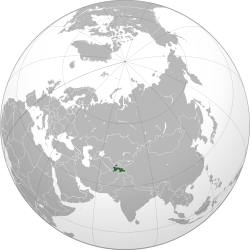Tajikistan: Islamic Party Under Pressure
By Eurasianet
Tajikistan’s most active opposition party has been hit by a spate of attacks in recent weeks, at least two of which appear linked to late July clashes between government security troops and armed groups in the restive autonomous province of Gorno-Badakhshan.
A local leader of the Islamic Renaissance Party (IRPT) was killed and another disappeared in Gorno-Badakhshan at about the same time government troops targeted armed groups there. Now, an IRPT party office near Dushanbe appears to have been torched by arsonists.

Thirty-two-year-old Sabzali Mahmadrizoev, the head of the party in Gorno-Badakhshan, reportedly disappeared shortly after being detained for speaking at a protest rally in Badakhshan’s main city Khorog on July 23. His body was found three days later near an army base outside the town. An IRPT spokesman described Mahmadrizoev’s death as “premeditated murder” and blames security officials. The party has demanded an investigation.
Sherik Karamkhudoyev, head of the party’s Khorog office, went missing on July 24, the day the fighting started. This week, after 14 days of silence, the State Committee on National Security (GKNB) said it is holding him in Dushanbe. When Karamkhudoyev was arrested, his office was also ransacked by soldiers who called the IRPT employees “terrorists,” the BBC’s Tajik service reported. IRPT officials say Karamkhudoyev has not been allowed access to his family or a lawyer.
The August 10 arson attack on a regional party office in Vahdat is the latest act of violence against the party. It bears similarities to a mysterious October 2010 blaze at the IRPT’s Dushanbe cultural center, commonly known as the “women’s mosque,” which IRPT members say was set deliberately.
Some observers see a connection between the IRPT attacks and Tajikistan’s election cycle. Rahmon will stand for reelection in 2013.
The IRPT, a legally registered party formed out of the Islamic opposition after Tajikistan’s civil war in the mid-1990s, has long faced pressure from President Imomali Rahmon’s administration. In recent years Rahmon has sidelined the IRPT – the only legal Islamic-inspired party in Central Asia – even though a 1997 UN-brokered peace deal promised the party 30 percent of government positions. The IRPT now holds two seats in Tajikistan’s 63-seat legislature and in recent years government officials have repeatedly tried to brand party members as terrorists. The charismatic party chief, Muhiddin Kabiri, has insisted the 40,000-strong party wants “a democratic, secular state with the rule of law.”
Hikmatulloh Saifullohzoda, an IRPT spokesman, says the recent events are designed to intimidate members.
“We didn’t even know if [Karamkhudoyev] was still alive. We’ve talked to his relatives and parents. They said that he disappeared the same day the military operation started,” Saifullohzoda, who suffered a savage attack outside his home in early 2011, told EurasiaNet.org on August 10. “The KGB now says they have him. … We don’t know why he was captured, but we know that he was not a member of one of the armed [rebel] groups.”
A spokesman for the GKNB, which is still popularly known by its Soviet-era acronym, KGB, did not answer his phone throughout the afternoon on August 10.
Khorog, scene of the late July fighting, remains tense. Also on August 10, government soldiers in Khorog fired on a minivan, killing one and injuring two, the Asia-Plus news agency reported. Officials in Dushanbe launched an offensive in Badakhshan after accusing local groups of involvement in drug trafficking, as well as the organization of the murder of a local security official.
Negotiations are continuing for four top rebellious commanders in Badakhshan to surrender. Since July 30, officials have collected hundreds of weapons in exchange for granting amnesty to most fighters. Officially, 30 militants, 17 government soldiers, and one civilian were killed in the operation, although there are widespread reports of more civilian casualties. Phone contacts with the region remain spotty, and officials continue to block access to popular news and social networks throughout the country.
